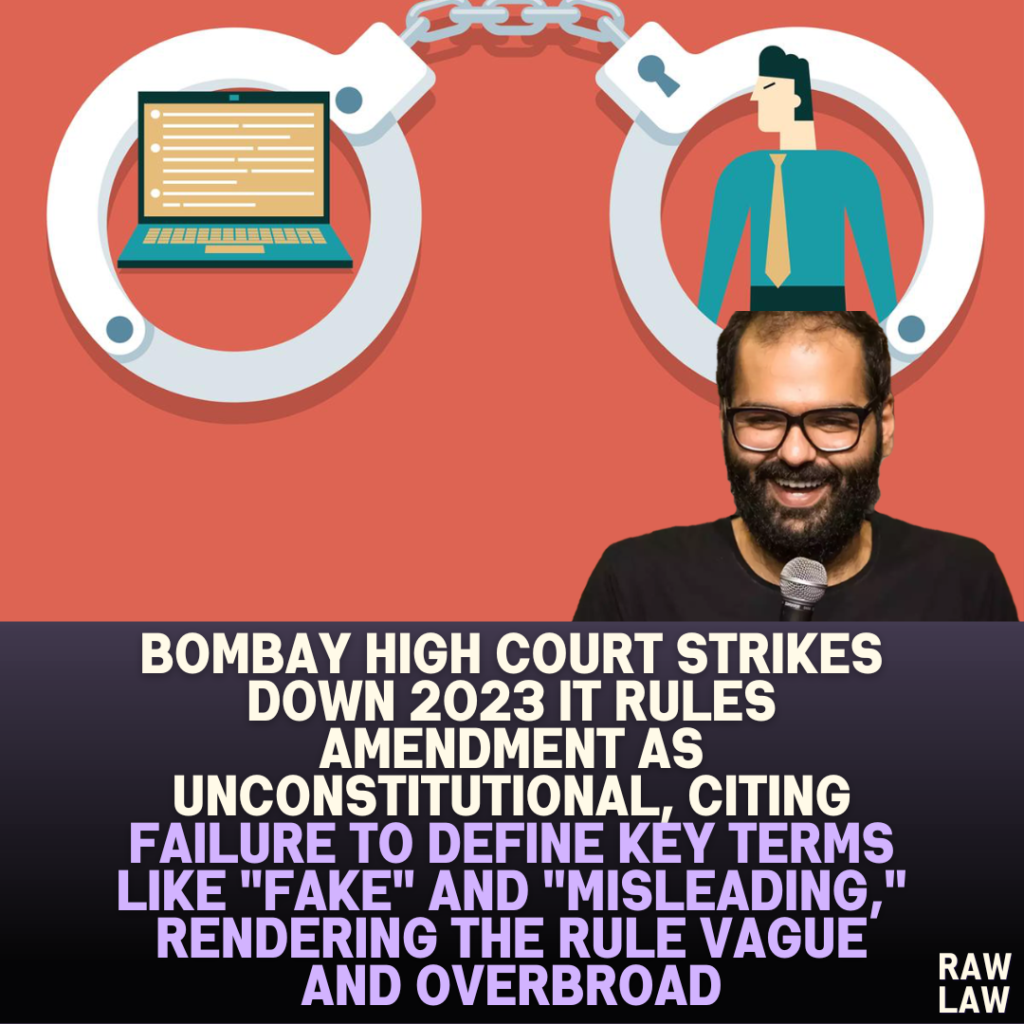Court’s Decision: The Bombay High Court, by a majority opinion, struck down the 6th April 2023 amendment to Rule 3(1)(b)(v) of the Information Technology (Intermediary Guidelines and Digital Media Ethics Code) Rules, 2021, as unconstitutional. The Court found the amendment violative of Articles 14, 19(1)(a), and 19(1)(g) of the Constitution of India, deeming it ultra vires the Information Technology Act, 2000. The petitions challenging the amendment were allowed, and no costs were awarded.
Facts: The petitioners, including Kunal Kamra and the Editors Guild of India, challenged the 2023 amendment to Rule 3(1)(b)(v) of the IT Rules, which introduced provisions that, according to the petitioners, had a chilling effect on free speech. The amendment sought to regulate “fake or false or misleading” content concerning government business without clearly defining these terms.
Issues:
- Whether the amendment to Rule 3(1)(b)(v) violated fundamental rights under Articles 14, 19(1)(a), and 19(1)(g) of the Constitution.
- Whether the amendment was ultra vires the Information Technology Act, 2000, and contravened the Supreme Court’s judgment in Shreya Singhal v. Union of India.
Petitioners’ Arguments: The petitioners argued that the amendment was vague, overbroad, and lacked sufficient safeguards. They contended that the undefined terms such as “fake” and “misleading” created uncertainty, leading to a chilling effect on free speech. They further argued that the amendment imposed unreasonable restrictions on the right to freedom of expression, violating Article 19(1)(a) of the Constitution.
Respondents’ Arguments: The Union of India defended the amendment, stating that it aimed to curb the spread of fake news, particularly concerning government business. The government argued that the amendment was necessary to maintain public order and prevent the spread of misinformation, which could harm national security and public interests.
Analysis of the Law: The Court examined the constitutionality of the amendment in light of Articles 14 and 19 of the Constitution. It applied the proportionality test to assess whether the restriction on free speech was reasonable. The Court also referred to the Shreya Singhal judgment, which had previously struck down Section 66A of the IT Act for similar reasons of vagueness and overreach.
Precedent Analysis: The Court relied on the principles established in Shreya Singhal v. Union of India and Gujarat Mazdoor Sabha, emphasizing that any restriction on free speech must be precise, narrowly tailored, and not overbroad. The Court reiterated that vague provisions, which fail to provide clear definitions, cannot stand the test of constitutionality.
Court’s Reasoning: The Court concluded that the amendment was unconstitutional because it failed to define key terms such as “fake” and “misleading,” rendering the rule vague and overbroad. This vagueness, combined with the lack of sufficient safeguards, created a chilling effect on free speech. The Court also found that the amendment did not satisfy the proportionality test, as the restriction was not justified by any pressing public necessity.
Conclusion: The Court struck down the 2023 amendment to Rule 3(1)(b)(v) of the IT Rules, 2021, declaring it unconstitutional and ultra vires the IT Act, 2000. The petitions were allowed, and no costs were imposed.
Implications: This ruling reaffirms the importance of clarity and precision in laws that regulate speech, particularly in the digital sphere. The judgment may influence future amendments to the IT Rules and other regulations that seek to control online content, ensuring that such provisions do not infringe on fundamental rights.
Also Read: Delhi High Court Holds Respondent in Contempt for Willful Disobedience of Restraining Order: “Disobedience Must Be Deliberate and Intentional, With Full Knowledge of the Consequences”; Orders Respondent to Appear in Person for Sentencing Hearinghttps://rawlaw.in/delhi-high-court-holds-respondent-in-contempt-for-willful-disobedience-of-restraining-order-disobedience-must-be-deliberate-and-intentional-with-full-knowledge-of-the-consequences-orders-respon/




Pingback: Delhi High Court: Title Disputes Must Be Resolved by Civil Courts, Not Through Administrative Demarcation; Quashes 2015 Demarcation as Illegal - Raw Law
Pingback: Uttarakhand High Court Orders Thorough Investigation in Case of Alleged Hate Crime Leading to Death Amid Inter-Community Relationship Dispute - Raw Law